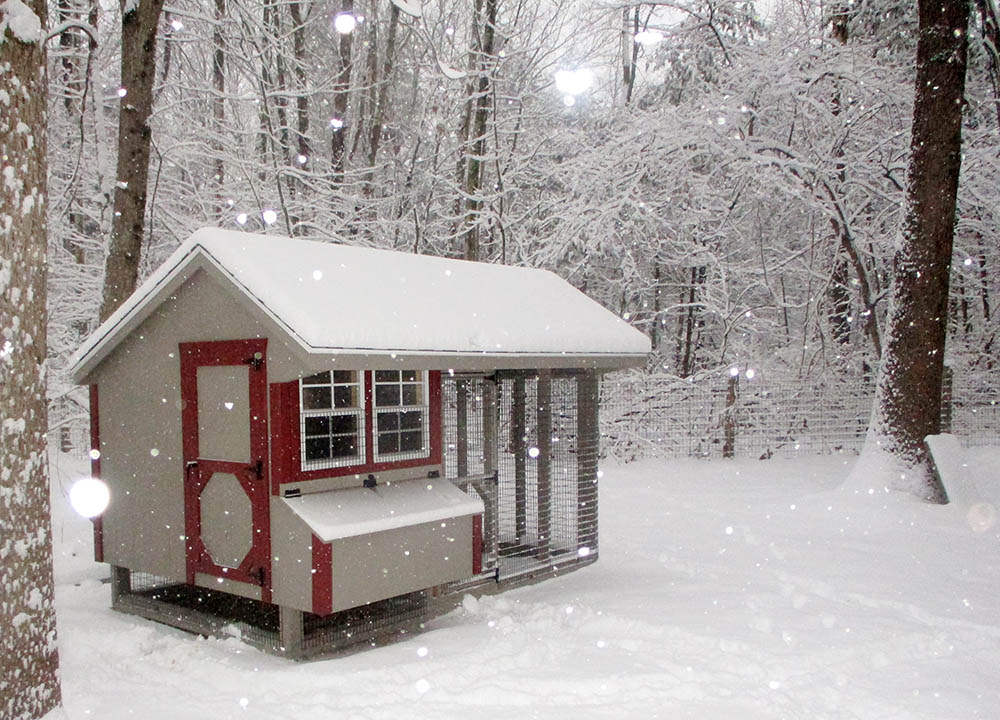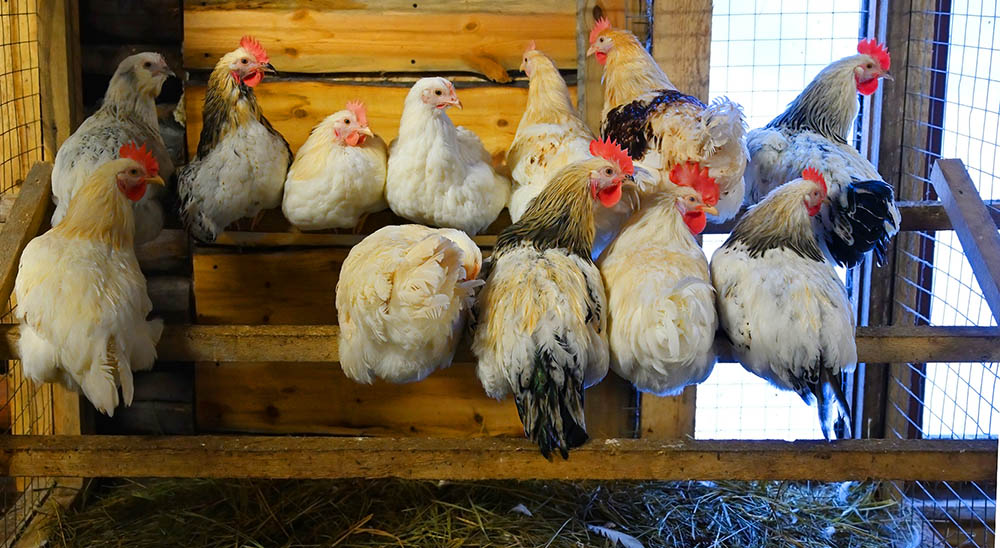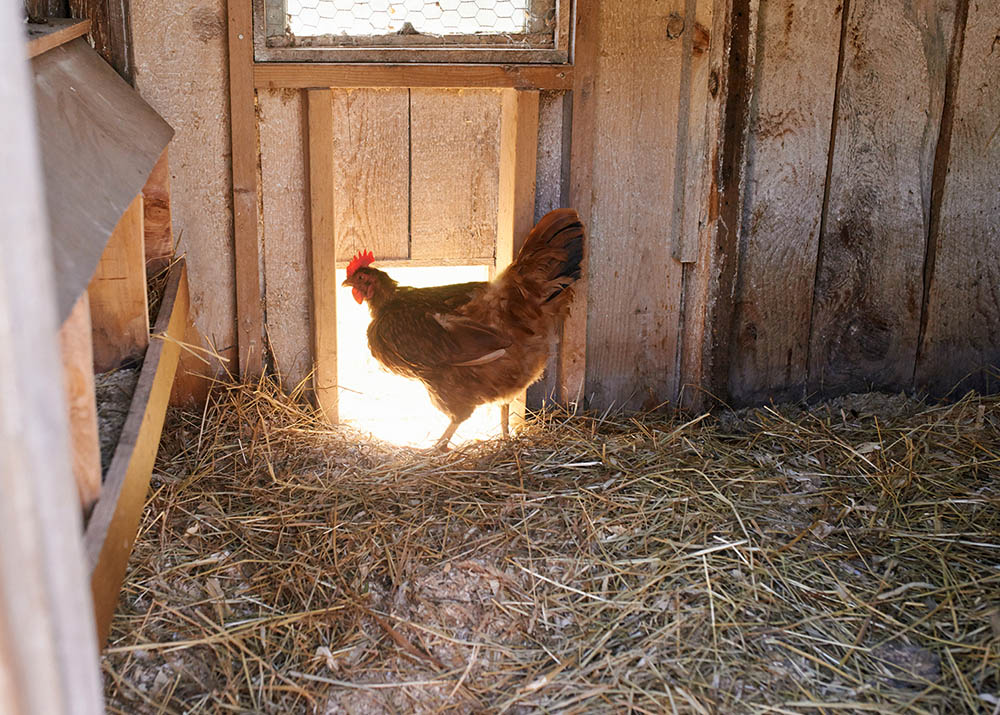Do I need to insulate my chicken coop?
Insulation isn’t mandatory or even necessarily a good idea. Focus on ventilation and dryness instead.
Horizon Structures sells our prebuilt chicken coops throughout the Continental US. That’s 48 different states – coast-to-coast. As you may or not be aware – that’s 9 major climate zones which include hot and humid to semi-arid and everything in between. Within those zones there are four distinct seasons which range from warm to extremely hot summers and sometimes brutally cold, often snowy winters. Weather and temperature extremes vary greatly.
One of the most common questions our chicken coop specialists are asked by new chicken owners, as they’re getting ready to purchase their first coop is: “Do I need to insulate my chicken coop?” The people asking that question seem most concerned about keeping their flock warm during winter when temperatures drop to bone-chilling levels.
Horizon Structures does not insulate our coops or offer insulation as an upgrade for several reasons:
- Insulating a coop increases the potential for issues with moisture and heat buildup, both of which can be very harmful to the birds. More benefits can be had by ensuring proper coop ventilation than enhancing a coop with insulation.
- Adding insulation requires extra materials and labor which can significantly increase the cost of the coop. Because Horizon Structures sells our coops across such a wide range of climactic zones, not everyone wants or needs an insulated coop. As such, we felt it best to let each buyer decide for themselves if insulation was warranted and how much time and cost, they want to put into it rather offer insulation as a Standard Feature in all coops. We also felt that numerous variables made it challenging to create an insulation upgrade that was both practical and affordable enough to appeal to buyers.
- Many breeds of chicken are very weather-hardy and do quite well in very cold conditions as long as their coop is kept dry and, relatively, draft-free. The birds will huddle together inside the coop and keep each other warm naturally tolerating even the coldest temperatures surprisingly well.
Since cold temperatures alone are rarely an issue for most breeds of chickens, there are a number of other factors that, when employed properly, offer a much greater benefit to the health and wellbeing of your flock. Some of these are essential coop features that Horizon Structures has built into EVERY coop we sell. Others are ‘good housekeeping practices that every chicken owner can easily follow at little or no cost.
- Ventilation means balancing airflow, dispersing excess heat and decreasing humidity and condensation. It helps remove moisture that builds up inside the coop:
- The flock’s breathing/respiration and droppings/waste produce moisture. Proper ventilation reduces the risk of freezing and frostbite (during extreme cold)
- Mold and bacteria grow during hot, humid conditions. Even the cleanest coop is full of microbes and dust particles. Good flow allows fresh air to circulate, reducing harmful gases (i.e., ammonia) and preventing respiratory issues.
- Every Horizon Structures chicken coop includes screened windows and generously sized, hinged vents that can be opened or securely latched closed depending on weather conditions and your objectives. 1”x2”, 14-gauge, vinyl-coated wire over vents and windows deter predators without compromising air flow.
- While the standard vents and windows, included with every coop, provide excellent ventilation, buyers have the option to add more of both if they wish.
- Waterproofing: Hens can tolerate very cold temperatures as long as the moisture inside the coop is kept to a minimum. Keeping the inside of your coop dry is essential!
- Horizon Structures standard roofing is a 40-year asphalt shingle just like on your house. The shingles are mounted on LP Tech Shield roof sheathing. Together they keep the elements at bay.
- Proper exterior siding is another essential weather beater/water barrier. Horizon Structures coops offer buyers the choice between LP Smartside or nature pine board and batten (or tongue and groove). Regardless of your choice, paint or stain is included as yet another layer to keep moisture outside.
- Flooring / drainage: Horizon Structures coops are built with a solid plywood floor. Buyers can upgrade to a non-porous epoxy floor to further reduce moisture (and bacteria growth)
Further ventilation and ‘stay dry’ features are built right into every coop design. Some coop models include pressure-treated legs that raise the structure off the ground enabling air to circulate underneath the coop. While the larger chicken coop floors are built on a 4×4 pressure-treated skid ‘foundation’ rather than being in direct contact with the ground. Once again, extra ‘air space’ under the coop and an additional measure to reduce moisture.
- Moisture management strategies:
- Deep Litter Option: deeper bedding provides an insulating factor in colder temperatures as well as extra heat from the deposition of the litter.
- Use moisture-wicking bedding: pine shavings, straw. And be sure to practice regular bedding turnover to further maintain dryness / prevent moisture build up.
- Safe supplemental chicken coop heating options may prove more economical and effective than insulating your chicken coop.
- If you’ve opted for an electrical package in your coop, the light included in the upgrade is a simple and low-cost fixture that will provide a bit of heat.
- The receptacle included in the electrical package enables you to add a heat lamp, a heated water bowl (prevents freezing) or even a heated roost bar to give you chickens a little extra comfort when it gets really cold.
- Warnings!
- Avoid space heaters or heating rocks due to fire/overheat risks!
- Be sure to use a thermostat, secure mountings and rodent or wildlife-resistant cords where applicable.
- Insulation can cause overheating if ventilation is blocked.
- Frost, chilled birds and frozen water are signs it’s ‘too cold’ and insulation or other measures may be needed.




